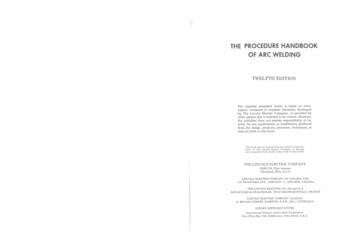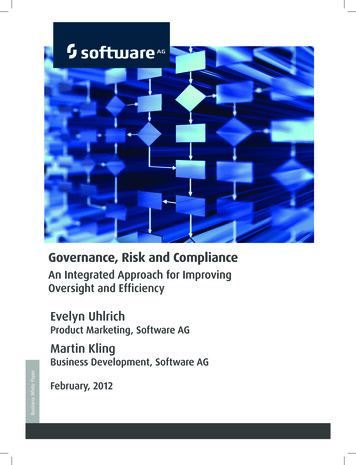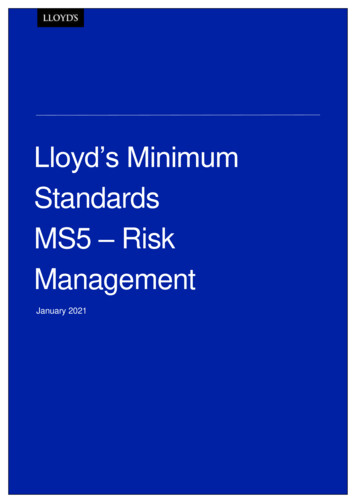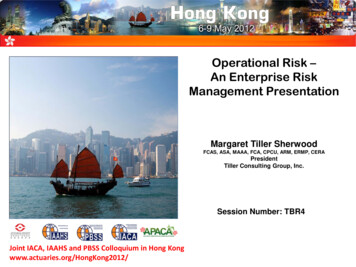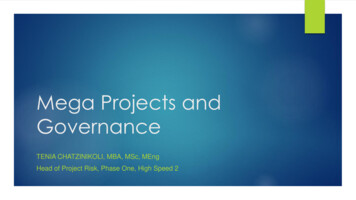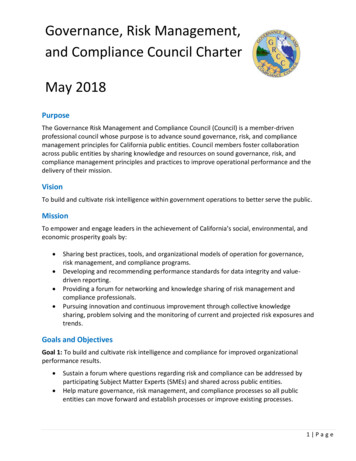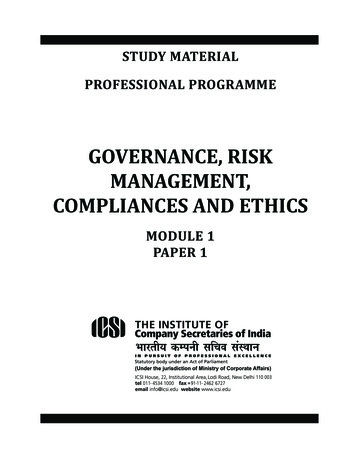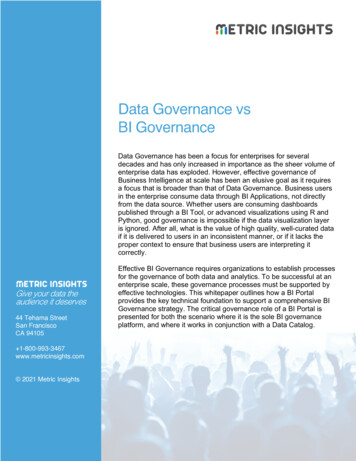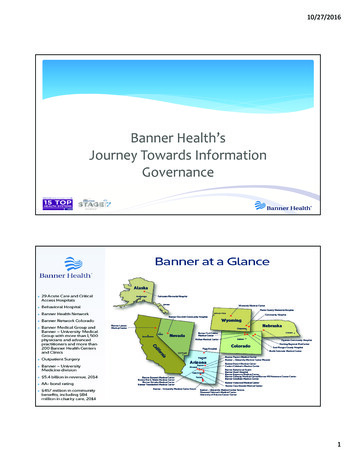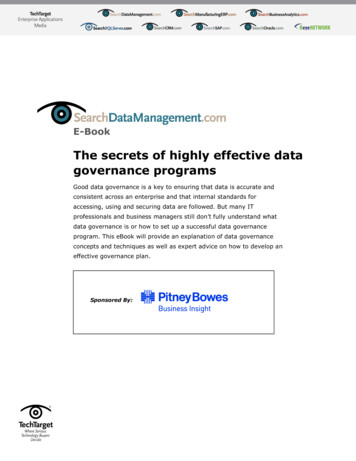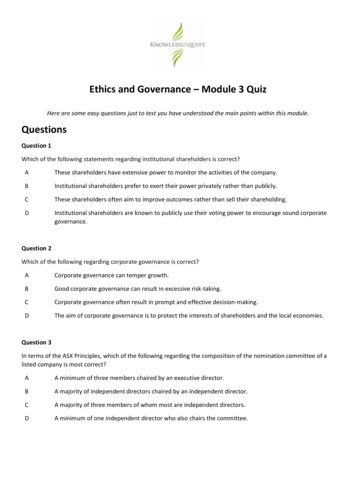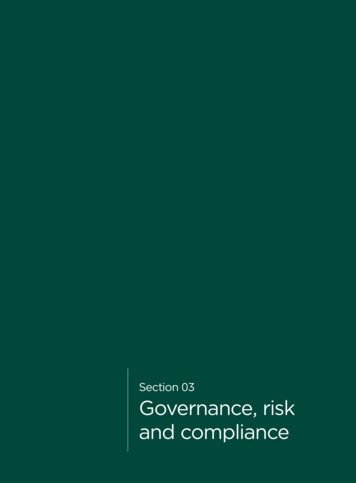
Transcription
Section 03Governance, riskand compliance
Ma’aden’s approach to governance, risk andcompliance (GRC) has grown ever stronger andmore comprehensive, led by our commitment tocomply with the local regulatory guidelines and newand emerging international industry standards.MGBM employees at Bulghah gold mine
2015 Annual ReportGovernance, risk and complianceGrowing commitmentto the highest standardsMa’aden’s corporate governance framework isbased on the provisions of regulations issuedby the Capital Market Authority (CMA) of theKingdom of Saudi Arabia, the Companies Lawand Ma’aden’s Articles of Association. Ourvision of becoming a world-class minerals enterprise guides us in continually strengtheningour governance, risk and compliance (GRC)framework.Under this framework, Ma’aden’s Board ofDirectors holds the ultimate authority andresponsibility to establish an effective GRCregime. Overall risk management efforts andinternal control measures that are aimed atprotecting the rights of shareholders and otherstakeholders are integral to GRC.Corporate governance in Ma’aden has two majorcomponents: strategic direction oversight.Strategic direction determines the businessmodel, business objectives, risk managementmethodology (including risk appetite) and controlof business conduct. The prime objectives ofoversight are risk management and internal andexternal assurance activities.The most important operating principles of corporategovernance at Ma’aden are: keep shareholders well-informed by providingthem accurate and timely information; maintain an effective Board committedto represent and safeguard the interest ofshareholders; deliver executive leadership led by thePresident and CEO ensuring that theorganization works hard to achieve commongoals and objectives; implement strong risk management measuresand internal controls to help Ma’aden achieveits strategic and operational objectives and maintain total compliance with applicable lawsand regulations.Company structureThe Ma’aden organization today includes threewholly owned subsidiaries and seven joint venturecompanies (Figure 1, overleaf). All of our subsidiariesexcept one – the Ma’aden Infrastructure Company(MIC), an internal services company supporting therequirements of other operating companies – areengaged in mining or manufacturing operations.The Ma’aden Board ofDirectors33
2015 Annual ReportGovernance, risk and complianceFigure.1 Ma’aden operational structure: subsidiaries and jointly controlled entitiesBusiness segmentCompany nameType of companyShareholdersProductsHQ LocationSaudi Arabian MiningCompany (Ma’aden)Joint stockcompanyPublicly listedProjectsRiyadhHoldingInvestment holdingSubsidiaries (Consolidated accounting)GoldMa’aden Gold and BaseLimited liabilityMetals Company (MGBM) companyMa’aden 100%Gold, zinc, copper, silver andleadJeddahInfrastructureMa’aden InfrastructureCompany (MIC)Limited liabilitycompanyMa’aden 100%Infrastructure services andhousingRiyadhIndustrial mineralsIndustrial MineralsCompany (IMC)Limited liabilitycompanyMa’aden 100%Bauxite, kaolin, and causticcalcined magnesiaRiyadhAluminiumMa’aden AluminiumCompany (MAC)Limited liabilitycompanyMa’aden 74.9%Alcoa 25.1%Aluminium ingots, T-bars, slabsRas Al KhairAluminiumMa’aden RollingCompany (MRC)Limited liabilitycompanyMa’aden 74.9%Alcoa 25.1%Billets and aluminium sheetsRas Al KhairAluminiumMa’aden Bauxite andAlumina Company(MBAC)Limited liabilitycompanyMa’aden 74.9%Alcoa 25.1%Aluminium ingotsRas Al KhairPhosphateMa’aden PhosphateCompany (MPC)Limited liabilitycompanyMa’aden 70%SABIC 30%DAP fertilizer, MAP fertilizer,sulphuric acid, phosphoric acid,and ammoniaRas Al KhairPhosphateMa’aden Wa’ad AlShamal PhosphateCompany (MWASPC)Limited liabilitycompanyMa’aden 60%Mosaic 25%SABIC 15%DAP fertilizer, MAP fertilizer,sulphuric acid, phosphoricacid, and ammonia (includingdownstream products)Wa’ad AlShamalJointly controlled entities (Equity accounted)PetrochemicalSahara and Ma’adenPetrochemical Company(SAMAPCO)Limited liabilitycompanyMa’aden 50%Sahara 50%Ethylene dichloride chlorineand caustic sodaJubailCopperMa’aden BarrickCopper Company(MBCC)Limited liabilitycompanyMa’aden 50%Barrick ME 50%Copper, silver, zinc, nickel,gold, lead, sulphur and cobaltAl MadinahAl MunawarahFigure.2 Key governance componentsArticles ofAssociationGovernanceprinciples andcomponentsEHS PolicyCode ofConductGovernance gulatorycomplianceThe four main bodiesoverseeing the GRCframework are supportedby the executivemanagement, subsidiariesand staff to ensureeffective implementationof its elements.
2015 Annual ReportGovernance, risk and complianceThe Board and theManagement CommitteeGRC frameworkOur GRC framework consists of four main bodies: Shareholders Board of Directors and supportingsub-committees President and CEO Management Committee.As shown in the management structure chart(Figure 3, overleaf), the four main bodiesoverseeing the GRC framework are supportedby the executive management, subsidiaries,affiliates and staff to ensure effective implementation of its elements, as shown under ‘keygovernance components’ (Figure 2).Role of shareholdersOur General Assembly is the platform where shareholders exercise their voting rights. Shareholderconsent is required for key decisions such as theapproval of the annual financial statements, theBoard of Directors’ report on the group’s activities,the review and approval of the Board of Directors’recommendations on dividend payments, theelection of board members, amendments to theArticles of Association, appointment of externalauditors and the raising of capital. Each shareholderowning more than 20 shares has the right to attendthe General Assembly, where they are entitled toone vote per share as per the company’s Articleof Association. We hold the General Assembly ofshareholders during the first three months followingthe end of the fiscal year. Extraordinary GeneralAssembly meetings are held when necessary.Board compositionIn accordance with the Companies Law andMa’aden’s Article of Association, our Board ofDirectors consists of nine members, includingthe Chairman and the CEO.The General Assembly of shareholders appointsthe directors for a term of three years. The PIF,which represents the government and holds 50percent of the company’s shares, appoints fourof the nine members. Eight of the current Boardmembers were appointed during the meetingof the Extraordinary General Assembly held onSeptember 25, 2014, and the ninth member wasappointed at the meeting of the ExtraordinaryGeneral Assembly held on November 13, 2014.As an independent director Soliman BinSaad Al-Humyyed tendered his resignationon December 9, 2014, the Board of Directorsappointed Abdulaziz Bin Abdallah Al-Suqairas independent director on January 20,2015. His appointment was approved by theGeneral Assembly meeting on March 2, 2015.Independent directors do not have a materialor pecuniary relationship with the company orrelated persons, except sitting fees and they donot own shares in the company.Board meetings and attendanceThe Board of Directors held seven meetingsduring the year, and the details of attendanceare presented in Figure 4 (overleaf).Board of Directors’ roleThe Board holds key responsibilities relatedto governance, risk management and internalcontrol. They include: the approval of Ma’aden strategy, businessplans and objectives of the Group; establish authority matrices across the Groupto ensure consistency in decision-making; the general evaluation of performance againstapproved strategic goals; the approval of quarterly and annual financialstatements; the establishment of the policies andguidelines related to internal control systems; the approval of policies and procedures to ensurecompliance with laws and regulations and the appointment of the Chief ExecutiveOfficer and President.The Board exercises its responsibilities throughseveral strategic tools: the Board’s sub-committees; a robust internal audit function;35
2015 Annual ReportGovernance, risk and complianceFigure.3 Ma’aden’s organizational structureGeneralAssemblyExecutiveCommitteeBoard dent/CEOAuditCommitteeCorporate CommunicationCEO and Board OfficeInternal AuditLegal and ComplianceSenior VP,Aluminium SBUVP,Precious MetalsSBUSenior VP,ProjectManagementand EngineeringStrategy,Planning andDevelopmentStrategy,Planning andDevelopmentStrategy andBusinessPlanningProgramManagementPrecious andBase MetalsExplorationMarketingand SalesSalesNew gistics andDocumentationMGBM tionsSenior VP,Phosphate andIM SBUVP, CorporatePlanning andDevelopmentSenior VP,HR andSustainabilityFinancialControlCorporateStrategy alsExplorationTreasuryEnterprisePlanning andPerformanceAdmin andGovernmentAffairsTechnicalServicesCorporate andProjectFinanceETGAN andBusinessImprovementSustainabilityERM SecuritySenior VP,ExplorationSenior VP,Finance andCFOGeneral AssemblyIMCBOD and sub-committeesSenior managementReporting directly to the Audit CommitteePresident’s officeSAMAPCOMICManagementJointly controlled entitesSubsidiaries36
2015 Annual ReportGovernance, risk and complianceThe three Board sub-committees meet separately severaltimes during the year. The Board has specified the roles andresponsibilities of each committee.7Board of Directorsmeetingsevery yearExecutive CommitteeThe Executive Committee comprises at least sixmembers appointed by the Board (Figure 5). TheExecutive Committee meets on a quarterly basis,and additional meetings are held if required.The quorum for the meeting is a majority of itsmembers. independent annual audits performed byexternal auditors and an effective whistle blower program to enablestaff and others to report wrongdoings andfraud-related risks.In order to help carry out its duties and responsibilities effectively, the Board has delegatedimportant matters to its three sub-committees: the Executive Committee; the Audit Committee; the Nomination and Remuneration Committee.The main duties and responsibilities of theExecutive Committee include, but are not limitedto, the following: review Ma’aden’s strategies, business plans andmake recommendations to the Board; review the workforce budget and operationaland capital expenditure budgets; review proposed long-term (more than threeyears) business, operations and financial plansand provide recommendations to the Board; review all core projects and businessCommittee meetingsThe three Board sub-committees meet separately several times during the year. The Boardhas specified the roles and responsibilities ofeach committee. The minutes of each Boardcommittee meeting are reviewed and approvedby the Board of Directors. Details of thefunctioning of each committee are given below.Figure.4 Board meetings and attendanceAttendance of 3/05201530/08201515/10201520/122015Abdullah Bin Saif Al-SaifChairmanIndependent Director HE Mohammed Bin Abdullah AlKharashiDirectorNon-executive Directorrepresenting PIF -- HE Suleiman Bin Abdulrahman Al-GwaizDirectorNon-executive Directorrepresenting GOSI - Mansour Bin Saleh Al-MaimanDirectorNon-executive Directorrepresenting PIF- Khalid Bin Hamad Al-SananiDirectorNon-executive Director,representing PIF Sultan Bin Jamal ShawliDirectorNon-executive Directorrepresenting PIF- - Dr Ziyad Bin Abdulrahman Al-SudairyDirectorIndependent DirectorAbdulaziz Bin Abdullah Al-Suqair*DirectorIndependent DirectorKhalid Bin Saleh Al-MudaiferPresident andCEOExecutive Director Baker Abdullatif Al-HaboobBoard Secretary- - *The Board recommended to appoint the ninth member on 20/01/2015 and the General Assembly approved this on 01/03/201537
2015 Annual ReportGovernance, risk and complianceFigure.5 Members of the Executive Committee, meetings and attendance (2015)Attendance of meetingNameThe AuditCommittee hasthe right, withoutany restrictions,to access allinformation, data,reports, records,correspondence,and other mattersas the Committeedeemsappropriate. TheAudit Committeeis also entitledto engageconsultants,accountantsor any otherindependent lah Bin Saif Al-SaifChairman HE Suleiman Bin Abdulrahman Al-GwaizNon-executive Director Sultan Bin Jamal ShawliIndependent Director Khalid Bin Saleh Al-MudaiferExecutive Director Abdulaziz Bin Abdullah Al-Suqair*Non-executive Director - Prof Richard T. O’Brien**MemberNew appointment *Was appointed as an Executive Committee member on 15/10/2015**Non Board member was appointed as an Executive Committee member on 15/10/2015expansions according to the approvedstrategies, business plans, operationsand long-term financial plans and makerecommendations to the Board and oversee and monitor the implementation ofMa’aden and subsidiary expansion projects.The current Executive Committee was established in 2014. A new member – ProfessorRichard O’Brien – was appointed to thecommittee effective October 15, 2015.All members of the Executive Committee,except O’Brien, sit on the Board of Directors.O’Brien is an accomplished executive with 30years of experience at CEO, COO and CFO levelwith significant financial and operational experience in mining and mining services, energyand power and the electric and gas utilitybusinesses. He has extensive experience withNYSE and Australian Stock Exchange listedcompanies in leadership positions coveringstrategic and business planning, finance andaccounting, safety, domestic and internationalbusiness mergers, acquisitions and divestituresand in identifying and mentoring “next generation” leaders. O’Brien has demonstratedleadership and communication capabilities andhas experience as an independent non-executivedirector of public companies.Audit CommitteeThe Audit Committee consists of five memberswho are appointed by the Board (Figure 6).The Audit Committee met several times duringthe year and the quorum for the meeting is amajority of its members. The Audit Committeehas the right, without any restrictions, to access3822/022015all information, data, reports, records, correspondence, and other matters as the Committeedeems appropriate. The Audit Committee is alsoentitled to engage consultants, accountants orany other independent third parties.The duties and responsibilities of the AuditCommittee include the following: review Ma’aden’s proposed financial policiesand procedures and recommend theiradoption and approval to the Board; review the interim and annual standaloneand consolidated financial statements of thecompany and all its subsidiaries; oversee the Group’s internal audit departmentto ensure efficiency in performing its activitiesand tasks assigned by the Board; review and approve the internal auditplan for the ensuing year, procedures andrecommendations to the Board on theappointment or termination of services andthe fees of external auditors, taking theirindependence into account; review the procedures for the request forproposal for the external audit appointmentand recommendations and conduct or authorize investigations related toany matter in the company’s interest.Abdullah Bin Mohammed Al-Fayez wasappointed to the Audit Committee in 2014.Al-Fayez joined the Arabian Oil Company inas an assistant supervisor of maintenancework in 1974. He moved to the Saudi IndustrialDevelopment Fund (SIDF) later, where heheld various positions in project and portfoliomanagement before his appointment asDirector of Marketing.
2015 Annual ReportGovernance, risk and complianceFigure.6 Members of the Audit Committee, meetings and attendance (2015)Attendance of 1514/122015HE Mohammed Bin Abdullah Al-KharashiChairman Khalid Bin Hamad Al-SananiNon-executiveDirector Abdullah Bin Mohammed Al-Fayez** Member Dr Abdullah Bin Hassan Al-Abdulqader* Member Mazen Bin Abdullah Al-Furaih**Member Walid Bin Ibrahim Shukri**Member - Resigned*The member resigned on 30/04/2015**Non Board memberIn 1981 he joined the Saudi-Spanish Bank inMadrid as an assistant to the general managerprior to joining the United States-Saudi ArabianJoint Commission. From year 2000 to 2006,he served as the CEO of the Saudi PublicTransport Company (SAPTCO).appraisals, reviews financial statements andevaluates new investment opportunities.Dr Abdullah Bin Hassan Al-Abdulqader wasappointed to the Committee in 2011. He wasa member of the CMA Board from the time itwas formed in July 2004 for a period of fiveyears. He was Provost of Graduate Studiesand Research at King Fahd University ofPetroleum and Minerals (KFUPM) from 1998 to2003. Dr Al-Abdulqader provides consultationon corporate governance and businessadministration for a number of companies andorganizations in Saudi Arabia and the Gulfregion. He resigned from the Audit Committeeon April 30, 2015.Walid Bin Ibrahim Shukri was appointed to theCommittee in 2014. He holds a bachelor’s degreewith honors in industrial management fromKFUPM and is a US and Saudi Certified PublicAccountant. He specializes in audit assurance,risk, compliance, corporate governance andfinancial reporting, with an academic andprofessional career spanning over 25 years.Shukri worked as an independent advisor to theErnst and Young Oil and Gas Centre of Excellencein Bahrain and for over 12 years, he was withPricewaterhouseCoopers (PwC), where he spentfour years as the country senior partner forthe Saudi Arabian practice and was part of theMiddle East Leadership Team. Prior to this heworked with Deloitte Touche Tohmatsu in boththe United States of America and Saudi Arabia.Mazen Al-Furaih was appointed to theCommittee in 2014. Since 2011, he has served asa Financial Analyst at the PIF, where he reviewscommercial loan applications, prepares projectNomination and Remuneration CommitteeThe Nomination and Remuneration Committeeconsists of four members who are appointed bythe Board (Figure 7). The committee meets on aFigure.7 Members of the Nomination and Remuneration Committee, meetings and attendance (2015)Attendance of 15Abdallah Bin Saif Al-SaifMansour Bin Saleh Al-MaimanChairman Non-executive Director Ziyad Abdulrahman Al-SudairyNon-executive Director ---Khalid Bin Saleh Al-MudaiferExecutive Director 39
2015 Annual ReportGovernance, risk and complianceFigure.8 Summary of Board and committee meetings (2015)Attendance of NominationandRemunerationCommittee4/4Independent DirectorsIn line with therequirementof Article 10 (a)of the CapitalMarket Authority’scorporategovernanceregulations,the Ma’adenBoard takes fullresponsibility forthe governanceof risk.Abdullah Bin Saif Al-Saif7/74/4-Abdulaziz Bin Abdullah Al-Suqair*5/73/4--Dr Ziyad Bin Abdulrahman Al-Sudairy6/7--1/4-Non-executive DirectorsHE Mohammed Bin Abdullah Al-Kharashi5/7-5/5HE Suleiman Bin Abdulrahman Al-Gwaiz6/74/4--Mansour Bin Saleh Al-Maiman6/7--4/4Sultan Bin Jamal Shawli5/74/4--Khalid Bin Hamad Al-Sanani7/7-5/5-7/74/4-4/4Prof Richard T. O’Brien**-1/4--Abdullah Bin Mohammed Al-Fayez**--5/5-Executive DirectorsKhalid Bin Saleh Al-MudaiferOther committees membersDr Abdullah Bin Hassan Al-Abdulqader***--2/5-Mazen Al-Furaih**--5/5-Walid Bin Ibrahim Shukri--4/5-*Was appointed as an Executive Committee member on 15/10/2015**Non Board member***The member resigned on 30/04/2015quarterly basis and the quorum for the meetingis a majority of its members. The duties andresponsibilities of the committee include thefollowing: annual review and recommendations of theskills, competencies and work experienceneeded to strengthen the capacity of theBoard and make suitable recommendations; annual verification of independent members’credentials and to determine if there are anyconflicts of interest if the member serves onthe Board of another company; evaluation of candidates for Boardmembership, while bearing in mind factorsincluding, but not limited to, integrity,credibility and responsibility; successfulleadership experience; strong businessacumen; independence and absence ofany conflict of interest; and the ability todevote the time necessary to carry out theirresponsibilities as member; assist the Board in preparation of a long-termsuccession plan when necessary; identify strengths and weaknesses in theBoard and propose methods to address gapsif any;40 review and approve all compensation(salaries, allowances, shares) for all executives(CEO, deputies and executive directors) on anannual basis; review and approve human resources policiesand procedures, administrative developmentprograms and plans for succession ofexecutives, evaluate objectives (including keyperformance indicators) to be achieved withinthe reward and incentive programs and consult with the CEO to review the successionplan and ensure the availability of aresource pool with sufficient qualifications,skills and experience to fill senior andleadership positions; identify opportunitiesand shortcomings in performance andsubsequent steps as part of successionplanning, including development of executivecompetencies.More details of the roles and responsibilitiesof the three committees are explained in theirrespective charters, which are available on ourwebsite: www.maaden.com.sa/en/investor/governance
2015 Annual ReportGovernance, risk and complianceManagement CommitteeOur senior management is comprised ofqualified and experienced senior executiveswith the knowledge and expertise necessary tolead Ma’aden’s business. We have been largelysuccessful in retaining our senior managementteam and in developing qualified employees andpromoting them to senior positions in the company.The Management Committee performs a numberof key functions. These include: the setting of clear business objectives withinan appropriate ethical framework; establishing efficient processes andmechanisms to ensure transparency and clearlines of responsibility and accountability; implementing sound business planningand integrating business risk managementthroughout the group; establishing clear boundaries for acceptablebehavior and evaluating and driving performance.management process is embedded across allthe operations and at all levels of managementthrough the design, implementation and monitoring of a risk management strategy and plan.The Board has delegated the responsibility ofdeveloping and continually updating the riskmanagement strategy and plan to the executivemanagement.Our strategy and plan are designed to takeadvantage of opportunities and protect capital,assets and income by mitigating the adverseimpacts of risk. Ma’aden’s Board of Directorsand executive management conduct regular riskassessments relating to various dimensions andaspects of operations to verify that adequate riskmanagement systems are in place.Risk managementEffective risk management is essential toensure that Ma’aden remains a focused, highperformance mining company. Risk is an integraland unavoidable component of Ma’aden’sbusiness and comprises both threats and opportunities. All employees across the companyare responsible for the management of risksin accordance with our ISO 31000-basedrisk management framework, policies andprocedures.Key business risksWe acknowledge that all risks cannot beeliminated. Ma’aden takes a comprehensiveapproach to understanding potential risks so thatappropriate mitigation processes are put in place.The following were some of the key business risksreported in 2015: Capital project execution Commodity price volatility Cyber security Skills shortage Access to infrastructure/water Interruptions in supply of power Social license to operate Environment Marketing Cost inflation Health and safetyBoard supervisionWe are committed to the effective managementof risks through proactive, competent riskmanagement policy and practice. In line withthe requirement of Article 10 (a) of the CapitalMarket Authority’s corporate governance regulations, the Ma’aden Board takes full responsibility for the governance of risk. The Boardachieves this by ensuring that an effective riskRisk monitoringAll the identified risks are monitored appropriately and adequate mitigation plans are in placeto tackle the identified risks. A formal process toreport on the implementation status of the mitigation plans against identified risks has also beendesigned and implemented. The Board is satisfiedthat Ma’aden has adopted an ongoing process toidentify, evaluate and manage significant risks.The President and CEO leads Ma’aden’sManagement Committee.Behavior forum in progressat one of our operationalsites, left, and a weeklyoperational meeting at AdDuwayhi mineWe acknowledgethat all riskscannot beeliminated.Ma’aden takes acomprehensiveapproach tounderstandingpotential risks sothat appropriateresponses are putin place.41
2015 Annual ReportGovernance, risk and compliance1,087staff attended Codeof Conduct awarenesssessionsFinancial risk managementPlease refer to the consolidated financialstatements for information on financial riskmanagement.Compliance and ethicsThe idea of regulatory compliance is central toour GRC framework. Our Board of Directors andsenior management are fully committed andkeen to promote a compliance and ethics culturewithin Ma’aden. We believe that complianceis closely related to ethics, which is one of thecentral pillars of our sustainability strategy. Ethicsin turn closely reflects our values of: integrity care teamwork ownership.It is this combination of compliance, ethics andvalues that led to Ma’aden’s Board approving anew Code of Conduct in early 2015.We work hard to ensure that Ma’aden puts inplace proper culture, policies and procedures toensure compliance. We provide our people withnecessary awareness and training to meet ourcompliance standards, which ensures that ouremphasis on following regulations, ethical considerations and values become an integral part ofbusiness strategies.We continually identify, evaluate, control andmonitor compliance risks and recommendappropriate controls and remedial actions whenneeded. Whenever there are changes in the lawsand regulations, or when there are new laws, weensure that corporate and all subsidiaries arebriefed thoroughly to ensure compliance. During2015, there were changes in Saudi Arabia’s laborlaw that required Ma’aden to make policy adjustments to ensure compliance. We are also abreastof the comprehensive updates to Saudi Arabia’sCompanies Law.42Our emphasis on compliance, ethics and ourvalues help entrench a value system withinMa’aden and its subsidiaries, creating awarenessand commitment to ’do things right’. Ouremphasis on compliance, ethics and values willcontinue to grow stronger as Ma’aden growsfurther as a business supplying valuable productsto the domestic, regional and internationalmarkets.New Code of ConductThe enhanced Code of Conduct covers a widerange of activities such as: employment practices; employee, customer and vendor information; communications; conflict of interest; relationship with business partners; EHS issues; ethical management practices.The Code is intended to guide our actions inconducting business in a socially responsibleand ethical manner and distinguish Ma’adenin the eyes of our stakeholders. It reflects ourcommitment as a group and as individuals, inrespecting the law, striving for a world-classMa’aden has adopted aprocess to identify, evaluateand manage significant risksfaced by the Group
2015 Annual ReportGovernance, risk and complianceworkplace environment, protecting the environment, achieving operational excellence andbenefiting the communities where we work.The Code has led to new policy initiatives withinMa’aden, such as an anti-corruption policy thatcomplements our whistleblowing policy.and teamwork. The campaign has already coveredseveral operations sites and will strive to make animpact across the Group in 2016.The corporate compliance team conducteda major campaign across Ma’aden to createawareness about the new Code of Conduct andits objectives, as well as the consequences ofviolating its provisions. The campaign, stronglysupported by the CEO, enabled the complianceteam to engage with subsidiary boards andmanagements and employees across Ma’aden.In 2015 we conducted 31 bilingual awarenesssessions attended by a total of 1,087 staff, representing 18 percent of our employees. We havealso issued an employee handbook on the Codein Arabic and English. The awareness campaignwill continue in 2016.The compliance team conducted a Ma’aden-wideemployee survey to assess the impact ofthe Code and ethics, and to measure staffcommitment to the five components of ourcompliance and ethics culture: knowledge courage decision-making trust belief.At the end of 2015 all employees were requiredto complete an annual confirmation form thatcovers most of Ma’aden policies. The formenables staff to examine and assess their activities to ensure they are in line with the company’scompliance, ethics and code of conduct.Internal auditInternal audit plays a key role in governance as anindependent, objective assurance and consultingfunction. Its mandate and centralized positionhelps Ma’aden to implement a systematic, disciplined approach to evaluate and improve theeffectiveness of internal controls. During 2015,we completed 103 internal audits across Ma’aden.In 2015, we invited the External QualityAssessment (EQA) team of the Institute ofInternal Auditors (IIA), the global associationof internal audit profession
our governance, risk and compliance (GRC) framework. Under this framework, Ma'aden's Board of Directors holds the ultimate authority and responsibility to establish an effective GRC regime. Overall risk management efforts and internal control measures that are aimed at protecting the rights of shareholders and other
